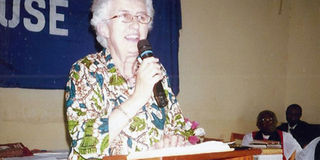Woman who helped set up Kivengere Girls School

Elizabeth Traill addresses students at the school in the late 1970s. Courtesy photos
What you need to know:
The greatest responsibility of head teachers is to nurture the talent of their students and staff. Roland D. Nasasira caught up with Elizabeth Traill, the woman who helped many girls in Kigezi Sub-region access formal education at a higher level
When you talk of early 1970s, the reign of the former Ugandan President Idi Amin remains ingrained in the memories of many. While many bask in the traumatic experience, for one Scottish woman, Elizabeth Traill, it is the memories of sowing the seeds of girl education in Kigezi region that define that period. “At a time when I became the first headmistress of Bishop Kivengere Girls School Muyebe, I was a Church Missionary Society Teacher at Kigezi High School. When I was approached by Bishop Festo Kivengere (RIP) to work at his school in 1974, I accepted to take on the job. And at a time of starting the school, the Muyebe community received it positively and gave us land and protected us from the dangers of Amin’s soldiers,” Traill says of the beginning of her journey as an educator.
Tough but faithful beginning
With a dream of making Bishop Kivengere a better girls school, Traill and Bishop Kivengere opened it with faith that God would provide their necessary needs because at that time, it was hard to get scholastic materials. “It called for a lot of hard work, but when we worked together, God provided everything we needed. We started with Senior One class in 1976 and opened a new class with each year that followed,” she says. A brain child of Melab, the bishop’s wife, the school opened with 40 girls chosen from 500 applicants.
“We conducted interviews all over Kigezi in about six centres, but faced difficulty when selecting because there were many girls who wanted to go to school but very few single sex girls’ schools existed.”
According to Peace Lwanga, a daughter of Kivengere, the painful memory of having to walk for two days from Rukungiri to Kabale to attend school inspired their mother’s dream. “At that time, there was no good Christian-founded school in Kabale. The only one was Kigezi High School where boys outnumbered girls. As a result, many girls lost the opportunity to join school. The nearby schools were in Mbarara, Masaka and Kampala,” she says.
Solving a crisis
At the time the school was opened, more than 1,500 girls from Kigezi High School had completed Primary Seven and were entitled to continuing to secondary level, but there were only 100 vacancies for them in the region. “We devised other means and expanded to 40 more positions and got two graduate teachers, one advanced level student leaver as a teacher, two night watchmen and four compound workers,” Traill recalls as she carefully ascertains the figures from her well-kept old notebook.
Through manoeuvering with challenges like having no money and sometimes reducing on the materials they needed to run the school, Traill and her team prayed a lot and God abundantly provided for them. “Through this, we learnt that people matter more than material things. There was no electricity, so we would use oil lamps and we built rain water tanks to store water,” she narrates.
After 12 years of her service at the school, leaving it with a well set up O-Level structure, and concluded plans for setting up A-Level structure, Traill left the country in 1986 for United Kingdom to attend to her sick parents.
Their say on elizabeth Trail’s time as the school head
Mary Turyamuhika Akankwasa, a former student, recalls Traill as a Geography and English Literature teacher who would motivate students to aim for good academic grades. “Even if you were academically weak in class and performed poorly, Traill would encourage you to read hard and score good grades. At the end of the day, when you listened to her, results would come out when you had performed well,” Turyamuhika says.
Marion Kyomuhendo, another former student, currently working as a Media Specialist at USAID’s Feed The Future Agricultural Inputs Activity project, says: “Traill had capacity to relay knowledge using practical examples. I traversed the hills of Muyebe to learn about contours, explicit examples of ox-bow lakes, among others. Whether it was a class about Rhineland or the prairies, one would feel the presence of that topic. I still appreciate the impeccable hand of discipline she instilled in all of us.”




